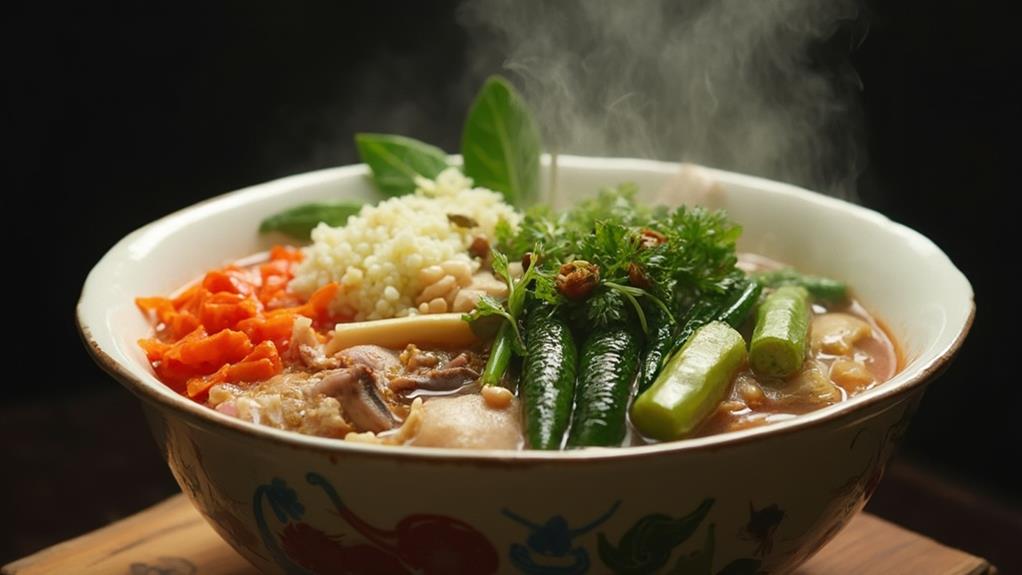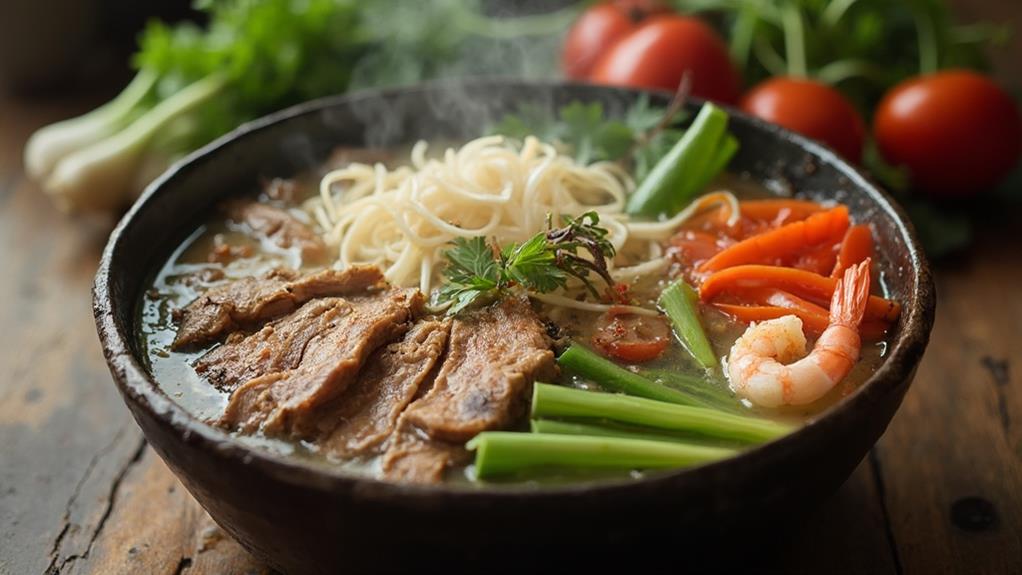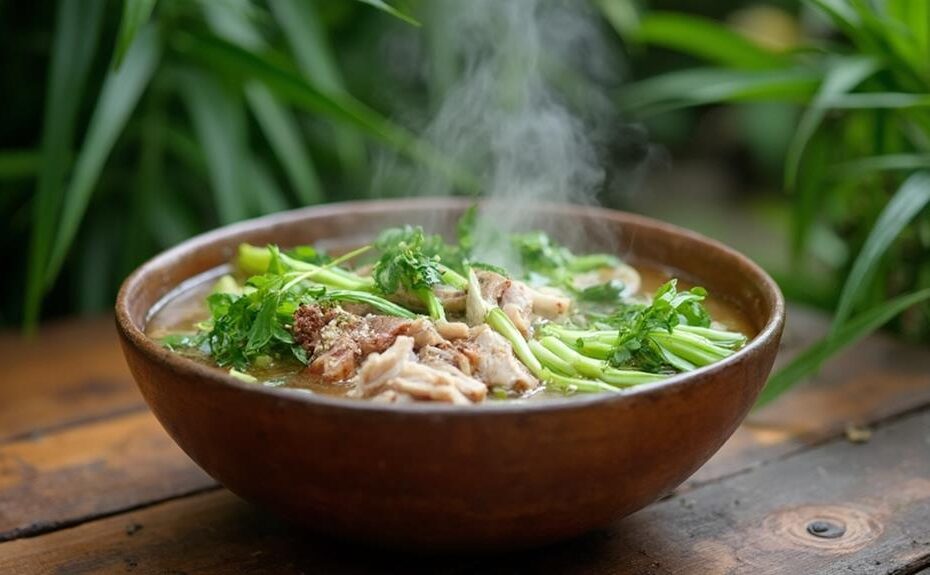Sinigang is a nutrient-dense soup that provides numerous health benefits. It is rich in vitamins A, C, and K, and essential minerals like magnesium and calcium, primarily due to its vibrant ingredients, including tamarind and fresh vegetables. For example, tamarind is an excellent source of vitamin C, with a single serving providing up to 30% of the daily recommended intake.
The protein sources in Sinigang, such as pork, beef, or shrimp, are rich in amino acids. These amino acids are critical for muscle repair and immune function. For instance, the amino acid glutamine found in protein sources helps to boost the immune system and supports muscle recovery.
Tamarind in Sinigang improves digestion and acts as a powerful antioxidant. The antioxidants in tamarind help to protect the body against free radicals, which can cause oxidative stress and contribute to chronic diseases. Additionally, tamarind has been shown to aid in digestion by increasing the production of digestive enzymes.
Overall, Sinigang's robust nutrient profile supports overall well-being. By consuming Sinigang, individuals can benefit from a nutrient-dense meal that not only warms the body but also provides essential vitamins, minerals, and antioxidants.
Nutritional Profile of Sinigang

Nutritional Profile of Sinigang
A serving of Sinigang, a traditional Filipino sour soup, weighing approximately 1189 grams, provides a balanced mix of macronutrients and essential vitamins and minerals.
This serving contains approximately 520 calories, with 180.9 calories coming from fat.
In terms of macronutrients, Sinigang provides 20.1 grams of total fat, 65.4 grams of total carbohydrates, and 28.8 grams of protein.
This soup is particularly rich in dietary fiber, contributing 17.4 grams, which is about 69.6% of the daily recommended value.
Sinigang is also a good source of various vitamins and minerals.
It is rich in Vitamin A (6861.9 IU), Vitamin C (189.6 mg), and Vitamin K (1797 mcg).
Additionally, it contains significant amounts of potassium (1959.9 mg), magnesium (148 mg), and phosphorus (538.4 mg).
These nutrients make Sinigang a nutritious and well-rounded meal option, providing a range of health benefits from supporting immune function to aiding in bone health.
Health Benefits of Tamarind
Tamarind's Antioxidant Properties
Tamarind is rich in antioxidants, which help protect the body from oxidative stress that can lead to chronic diseases.
The antioxidants in tamarind, particularly beta-carotene and phenolic compounds, neutralize free radicals, preventing cell damage and promoting overall health.
Essential Minerals for Bone Health
Tamarind is a good source of essential minerals, including magnesium and calcium, crucial for bone health and other bodily functions.
Magnesium supports over 300 processes in the body, including nerve and muscle function, blood pressure control, and strong bones.
Anti-Inflammatory Properties
Tamarind has anti-inflammatory properties that help reduce inflammation in the body.
Its pulp is rich in potassium and polyphenols like flavonoids, which are known to reduce inflammation and improve conditions such as arthritis and inflammatory bowel disease.
Managing Diabetes and Weight
Tamarind has been shown to help manage diabetes through its hypoglycemic effects and can contribute to weight management by reducing fat absorption.
These benefits make tamarind a valuable addition to your diet.
Can Sinigang be made as a vegetarian or vegan dish to still get its health benefits?
Yes, Sinigang can be made as a vegetarian or vegan dish while still retaining its health benefits. By using vegetable broth or tamarind as a souring agent, and adding a variety of vegetables like kangkong, radish, and eggplant, you can enjoy the delicious flavors of Sinigang as part of vegetarian and vegan Filipino food alternatives.
Protein Sources in Sinigang

Sinigang is a nutrient-rich dish that packs a punch when it comes to protein sources.
The primary protein sources in sinigang are pork, beef, or shrimp, each offering distinct benefits. Pork is rich in essential amino acids, providing around 25 grams of protein per serving, making it a robust option for those looking to meet their protein needs.
Beef brings iron and zinc into the mix, crucial for energy production and immune function. Shrimp, on the other hand, provides about 20 grams of protein per serving and omega-3 fatty acids, beneficial for heart health.
Vegetarians can enjoy sinigang too, as tofu or legumes serve as excellent protein alternatives. Tofu offers about 10 grams of protein per half-cup, while lentils add around 9 grams per half-cup.
These protein sources ensure you're fueling your body with essential nutrients while enjoying a comforting bowl of soup.
Medicinal Properties of Ingredients
Sinigang ingredients offer impressive medicinal properties that can enhance overall well-being.
Tamarind, the signature souring agent, is rich in antioxidants and vitamin C, which helps boost the immune system and promote healthy gut flora, improving digestion.
The various vegetables, such as spinach and radish, are packed with essential vitamins and minerals. For instance, spinach is high in iron and calcium, supporting bone health and helping to combat anemia.
The addition of tomatoes not only contributes to the flavor but also offers lycopene, a powerful antioxidant linked to a reduced risk of chronic diseases.
Protein sources, like pork or shrimp, are rich in amino acids that aid in muscle repair and overall growth.
Moreover, the herbs, such as ginger and chili peppers, have medicinal benefits.
Ginger is well-known for its anti-inflammatory properties, which can help alleviate sore throats and digestive issues.
Chili peppers contain capsaicin, which may boost metabolism and reduce pain.
Preparing Sinigang for Health

Optimizing Sinigang's Nutritional Value
When preparing Sinigang, it's essential to focus on nutritious ingredients to enhance its health benefits. Using lean protein sources like salmon or shrimp provides omega-3 fatty acids, which support heart health and reduce inflammation. These protein sources can be paired with a variety of vegetables, such as spinach, radish, and eggplant, to boost the soup's vitamin and mineral content.
Spinach is rich in iron, crucial for energy production, while radish offers antioxidants that combat oxidative stress.
Tomatoes, another essential ingredient, not only enhance flavor but are packed with lycopene, promoting skin health and reducing cancer risk.
Tamarind, the soup's signature souring agent, provides vitamin C and aids in digestion.
To add more nutritional value, mung beans can be incorporated, which are rich in protein and fiber, helping to manage weight and regulate blood sugar levels.
Finally, using low-sodium broth or homemade stock controls salt intake while maintaining a rich, savory flavor.
